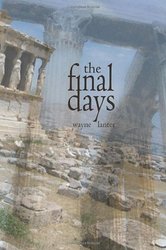A BOOK TO INHABIT
THE FINAL DAYS by Wayne Lanter
Twiss Hill Press
reprinted from Stride Magazine

This is a giant of a book (411pp); and one which I doubt I can do justice to in this short review. Scenario and plot are simple enough. A Midwestern campus with, initially, a 55 year old philosophy professor beginning a midwinter affair with a 22 year old student, ramifications thereof. However we know that we are in for far more than a linear unfolding of events when one of the first minor characters introduced is called Laertes (specialist field the Peloponnesian war); soon followed by another, with wrinkled visage and black-painted fingernails, called Morgana. In addition to that the central character, Professor John Carter, is delivering up a questioning course on ethics. He also, at seemingly inappropriate moments, performs magic tricks. Ah yes, we say, whimsical and fantastical. But expectations are immediately confounded by the seemingly prosaic; and we flounder on looking for signposts to take us towards the comfortingly familiar.
A book to inhabit, to dwell on. At first I wondered if the sleight-of-hand magic tricks hinted that things to come might not turn out to be what they had initially seemed; or was this to be a Northern attempt at magic realism? Uncertainty is at the very heart of this narrative, which starts in a snowstorm. Indeed author Wayne Lanter slips and slides a bit before he finds his stride. Then, about 5 chapters in I look to the title and wonder if these are the final days of a marriage? An affair? A job? The fall semester? ...No, too simple. A life?
This professor of philosophy, concerned here with ethics, is living dangerously and trying to decide what is truth and who might be telling it and why. There is a huge cast of fellow academics and administrators, their relations and townsfolk, plus a cast of quotable characters from Plato to Hume. But, with the author’s avoidance of stereotypes, one is never quite sure where this odyssey is bound. Or when. Many of the timepieces are broken or stopped.
This almost closed, but self-absorbed, world of campus, is more gown than town, yet Wayne Lanter manages to present us with the ragged edges of a whole world; mislead us with many a digressive sleight-of-mind. So too do classical allusions abound. And also mislead. There are deaths here; one signalled, others not. Sex, too. And non-sex.
Part of the narrative drive is provided by anti-hero John Carter being so hard to predict - in his actions, his thoughts, his memories, his judgements. But credible, certainly. He is not one of these: ‘...Others took degrees as union cards and joined the assembly line in the flow of dollars in and the flow of something less than scholars out...’ Attempting to inculcate values and virtues within an institution dominated by people without any, he is a resentful witness to a college run as a wholly commercial enterprise. (I urge any British parent of children below secondary school age to read this book, because this is where our tightwad governments are rapidly taking our institutions of higher learning.)
Within this tale, though, Wayne Lanter questions more than the values inherent in one system of education. Nor are his judgements by any means simple, being complicated by his characters’ human muddleheadedness and contradictory drives. He is particularly good on the self-perpetuating corruption at the heart of any establishment ¬ to belong one takes on the colour of one’s surroundings; and those that follow adopt that same camouflage thinking that is what is required, and they all snigger together over the cynicism of their belonging.
With the central character preoccupied with ethics, with the plot taking many a twist and turn as he, unrepentant, endeavours to prove his innocence to guilty men, and where victims are also plotters and perpetrators, our own value judgements are engaged and exercised. And, like Professor Carter, we don’t always know what is happening. Although some of the confusion was avoidable. Some very similar spellings among the large cast had me backtrack a few times to see who exactly had been saying what to who. Even that, though, had its benefits, bringing to light a telling phrase here and there that I’d passed over before.
What by-the-by impressed me, as a non-academic non-American, and was a given here, was just how fundamentalist a society the USA is; and, yet, how that same society manages to publish books as complex as this and whose publishers anticipate an interested and sympathetic domestic readership.
Sam Smith